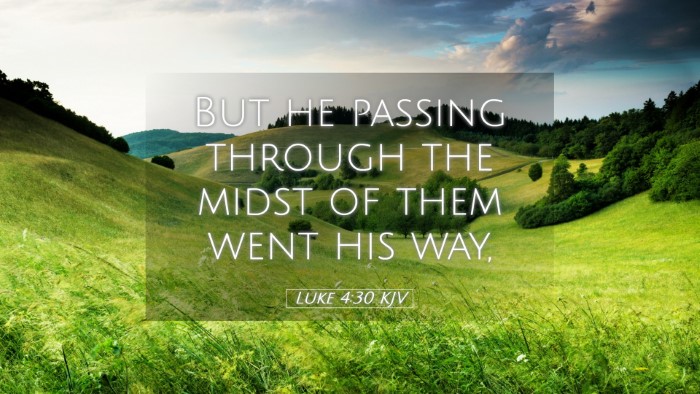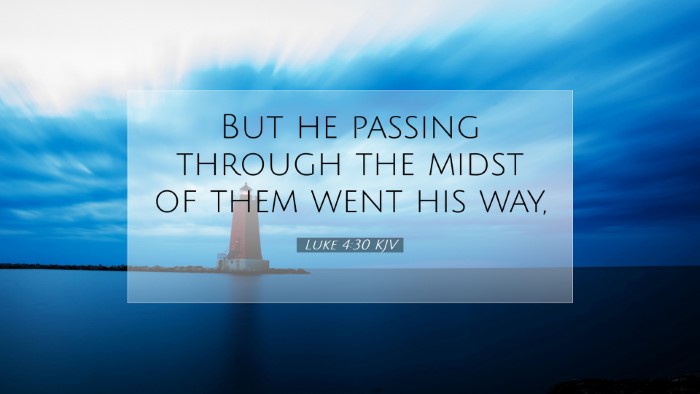Commentary on Luke 4:30
Luke 4:30 states, "But he passing through the midst of them went his way." This verse is a pivotal moment in the narrative of Jesus' early ministry, demonstrating His authority and mission in the face of rejection.
Context of the Passage
This verse occurs in a context where Jesus has returned to Nazareth, His hometown, and has read from the scroll of Isaiah in the synagogue. His declaration that He fulfills this prophecy incites both awe and ire among the listeners.
The Rejection at Nazareth
Prior to reaching verse 30, Jesus has revealed the spiritual blindness of His fellow townsfolk, who, despite witnessing miracles, struggle to accept Him as the Messiah due to their familiarity with Him. This rejection culminates in an attempt to push Him off a cliff (Luke 4:28-29).
The Significance of Jesus' Response
Jesus' response to their hostility is significant for several reasons:
-
Demonstration of Authority:
In His calmness and composure, Jesus exhibits divine authority. As noted by Matthew Henry, this shows that Jesus is not subject to human plans or anger; He moves through their midst as if their hostility does not hinder His purpose.
-
Fulfillment of His Mission:
Albert Barnes emphasizes that this action further illustrates the reality of His mission: He came to save, not to be a captive to the rejection of men. Jesus’ ability to 'pass through' also signifies His refusal to be deterred from His purpose.
-
Illustration of Spiritual Insight:
Adam Clarke points out that those who truly understand and believe in Christ will not be hindered by societal rejection. The very act of passing through implies Jesus’ divine insight into not only the physical but also the spiritual realm.
Theological Implications
This moment in Luke 4:30 holds several theological implications for pastors and scholars:
-
The Nature of Christ:
This incident highlights the dual nature of Christ; fully God yet experiencing rejection from those He came to save. It points to a profound truth about the human condition and the nature of faith.
-
The Gospel’s Resistance:
The reaction of the crowd serves as a reminder of the opposition faced by the Gospel. As Matthew Henry articulates, this indicates that the message of Christ will be met with resistance, but the truth will always prevail.
-
Mission and Identity:
Jesus’ mission was to turn the hearts of men towards God, regardless of personal rejection. This verse encourages believers to carry on with the mission even amidst adversity.
Application for Today
For modern-day readers, Luke 4:30 prompts reflection on the following:
-
Courage in Ministry:
Pastors and church leaders facing discouragement from congregations can draw strength from Jesus’ example. His ability to continue on His mission despite rejection offers a model for perseverance.
-
Understanding Rejection:
Understanding that rejection can be a part of the Christian walk. Believers are called to engage their communities genuinely, yet must be prepared to experience pushback, just as Jesus did.
-
The Call to Witness:
This passage encourages believers to proclaim the Gospel boldly. As Jesus passed through the midst of opposition, His followers are also called to witness despite the challenges they may face.
Conclusion
Luke 4:30 encapsulates a significant moment that sheds light on Jesus' ministry and the challenges of fulfilling one's divine calling in the face of rejection. The insights given by Matthew Henry, Albert Barnes, and Adam Clarke provide a rich foundation for understanding the depth of this passage. For pastors and scholars, this verse serves as a potent reminder of Christ’s authority, the nature of spiritual truth, and the perseverance required in the Christian faith.


